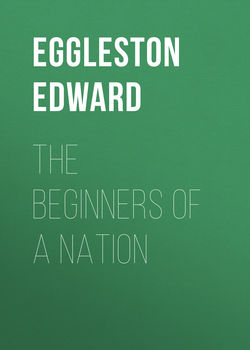Читать книгу The Beginners of a Nation - Eggleston Edward - Страница 16
BOOK I.
RISE OF THE FIRST ENGLISH COLONY
CHAPTER THE SECOND.
JAMES RIVER EXPERIMENTS
VI
ОглавлениеEmergence of Captain John Smith. Peril and adversity bring the capable man to the front. The colony proceeded, by means of the technicalities habitually used in those days, to rid itself of its president, Wingfield, a man of good intentions but with no talents suitable to a place of such difficulty. Slowly, by one change and then another, the leadership fell into the hands of Captain John Smith. During the voyage he had drawn upon himself the jealousy of the others, probably by his boastful and self-asserting habit of speech. When the list of councilors, till then kept secret, was opened at Jamestown and his name was found in it, he was promptly excluded by his associates. It was only on the intercession of the clergyman, Hunt, that he was at length admitted to the Council.
His paradoxical character has been much misunderstood. Those who discredit the historical accuracy of Captain Smith's narratives consider his deeds of no value. It is the natural result and retribution of boasting that the real merit of the boaster is cast into the rubbish heap of contempt along with his false pretensions. On the other hand, those who appreciate Smith's services to the colony in its dire extremities believe that the historical authority of such a man must be valid.
His romantic tendencies. His character, double and paradoxical as it is, presents no insoluble enigma if we consider the forces of nature and of habit underlying its manifestations. According to his own highly colored narrative, he had fed his fervid imagination on romances of chivalry. The first natural result in a youth so energetic as he, was that he should set out to emulate the imaginary heroes of whom he had read. It was equally a matter of course that a man of his vanity should exaggerate his own adventures to the size of those that had excited his admiration. The same romantic turn of the imagination that sent him a-wandering after exploits in Flanders and in the wars with the Turks, in Barbary, and in Ireland, made his every adventure seem an exploit of heroic size. Such a man is valuable when boldness and aggressive action are in request; to relate facts where autobiography is involved he is little fitted.
His story of his own life. According to Smith's own narrative, he was robbed and shipwrecked at sea; he slew three infidel champions in single combat and cut off their heads, just for the amusement of the ladies; he was made captive by the Turks and escaped by slaying his master with a flail; he encountered pirates; in the plunder of a ship he secured by the grace of God a box of jewels; and, to round off his story, he was beloved in romance fashion by a fair Turkish lady, one Tragabigzanda; befriended by a Russian lady, the good Calamata; and, later, was snatched from the open jaws of death by the devotion of the lovely Princess Pocahontas, daughter of King Powhatan, of Virginia. What more could one ask? Here are the elements of all the romances. But, to crown all, he emulated the misadventure of the prophet Jonah, and he even out-Jonahed Jonah. He got ashore by mere swimming without the aid of a whale, when cast overboard by Catholic pilgrims to appease a tempest. Never any other wanderer since the safe return of Ulysses passed through such a succession of marvelous escapes as this young John Smith. His accidents and achievements, even without exaggeration, were fairly notable, doubtless, but they are forever obscured by his vices of narration.
Interest in colonization. By the time he was twenty-eight years old this knight-errant had pretty well exhausted Europe as a field for adventure. Soon after his return to his own land he found the navigator Gosnold agitating for a new colony in Virginia, the scene of Ralegh's failures. That being the most difficult and dangerous enterprise then in sight, nothing was more natural than that Smith should embark in it. From this time to the end of his life this really able man gave his best endeavors to the advancement of American colonization. His character. In counsel he was accounted wise, and his advice was listened to with more than common deference in the assemblies of the Virginia Company as long as the company lasted. In labor he was indefatigable, in emergencies he proved himself ready-witted and resourceful. His recorded geographical observations are remarkably accurate considering his circumstances, and his understanding of Indian life shows his intelligence. His writings on practical questions are terse, epigrammatic, and wise beyond the wisdom of his time. But where his own adventures or credit are involved he is hardly more trustworthy than Falstaff. His boasting is one of the many difficulties a historian has to encounter in seeking to discover the truth regarding the events of an age much given to lying.
